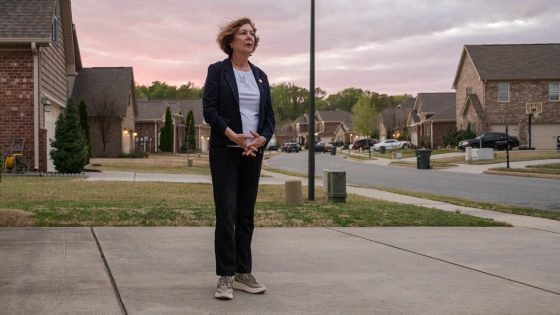When Marilyn Lands, a Democrat, won an election last month for a northern Alabama State House district that Republicans had held for more than two decades, she stretched the political power of reproductive rights into the edges of Appalachia.
Democrats lauded her victory as an example of how potent the issue will be in November, more than two years after the Supreme Court’s conservative majority overturned Roe v. Wade. And while Republicans argued that Ms. Lands’s suburban district had been ripe for Democratic pickup for years, it forced some to acknowledge that they needed to rethink their approach to talking about abortion on the campaign trail.
Democrats had long eyed Alabama’s 10th District, which encompasses Madison County and its seat of Huntsville. Nestled in the mountains less than 100 miles from the Tennessee border, the area is home to both NASA’s Marshall Space Flight Center and the U.S. Army’s Redstone Arsenal — and with it, a growing number of young families, plus scores of engineers and federal government employees. In his 2020 presidential campaign, Donald J. Trump won Madison County by eight points, his second slimmest margin in the state. The county is one of Alabama’s wealthiest and best educated.
And Ms. Lands’s contest, a special election called when a Republican resigned after pleading guilty to charges of voter fraud, received a seismic jolt. Weeks before the election, the Alabama State Supreme Court ruled that frozen embryos were considered children, casting immediate doubt on access to in vitro fertilization, a popular fertility treatment. Republican lawmakers in the state were forced to scramble in the face of public backlash and anger from families pursuing the treatment. And Ms. Lands adjusted, appealing to her party’s base voters as well as conservatives concerned about increasing restrictions on women’s health care.
“I’ve heard it said that there are these arcs in history and these places are where the pendulum swings,” Ms. Lands said in an interview at her home in Huntsville, which for the last three months served as the headquarters of her campaign’s canvassing operation. “And so I hope that’s where we’re at — that it’s beginning to tilt. Not necessarily so much in the other direction, but just back toward balance.”
Ms. Lands’s victory doesn’t disrupt the Republican supermajority in Alabama’s House, and only time will tell if it is a bellwether for Democrats’ fortunes in similar districts across the state or the South. Turnout was limited, with 6,000 voters casting ballots in the special election.
But by successfully tying abortion rights to I.V.F., she provided an early blueprint for members of her party who are eager to make reproductive rights central to their campaigns.
“It’s not a Black issue, it’s not a white issue. It’s an issue of dignity,” said the Rev. Dr. Randy Kelley, the Alabama Democratic state party chairman.
It’s possible that running on abortion rights alone might not have been enough to overcome the district’s conservative tilt. Ms. Lands ran and lost by seven points in 2022 despite being vocal about her support for abortion rights in the immediate aftermath of Roe v. Wade’s reversal, which came months into her first campaign. She had not yet publicly shared the story of her own abortion — something she said she and her team didn’t see as necessary when the Supreme Court’s ruling was so fresh on voters’ minds. But Alabama Republicans, who make up more than half the electorate, have largely supported limits on abortion, and in 2018 backed an initiative that helped clear the way for a near-total ban on the procedure.
Ms. Lands, 65, decided to run for the seat again when its Republican state representative resigned. In early February, she publicly shared the story of her choice to terminate a nonviable pregnancy. Days later, Alabama’s Supreme Court ruling came down.
Prominent Republicans, including former President Donald J. Trump, rushed to blunt the potential political fallout from the I.V.F. ruling. Alabama Republicans quickly passed a shield law so that families could restart the expensive treatments, which can take an emotional and physical toll. But Democrats seized on the ruling as an example of what they had been warning voters of since the fall of Roe: The same Republicans who championed “family values” would limit women’s ability to start their own.
Ms. Lands, who called Alabama “ground zero” for the fight over abortion rights, said that as she knocked on doors she heard from voters in her district, her lifelong home, about how the ruling would hurt them. Some said they worried for their children and grandchildren, some shared their own abortion stories and some indicated that they would be more hesitant to take jobs in the state, she said.
“I’ve heard from other families who say, ‘We’re going to move,’ you know, ‘we’re going leave,’” she said.
Ms. Lands’s campaign ads featured local OB-GYNs, her own abortion story from decades ago and the story of a young woman who said she was forced to drive hours for medical care after it became clear she could not carry her pregnancy to term last year because her baby would not survive.
“We need to repeal Alabama’s abortion ban and protect women’s freedoms,” Ms. Lands said in one of her ads, bemoaning a loss of rights that younger women are experiencing. “And if you elect me, that’s exactly what I plan to do.”
Ms. Lands’s campaign staff included an army of volunteers with both homegrown organizers and turnout experts from other parts of the state and neighboring Mississippi. All were spurred on by her story and had help from national groups like Planned Parenthood, whose southeast affiliate made Ms. Lands their first endorsement of the 2024 cycle. As a result, she received donations from nearly 1,200 individual donors, according to her campaign.
For other figures in the state, it was not just Ms. Lands’s message on abortion that compelled voters to support her — her connections to Black Democrats in her district made a big difference.
“When you say ‘Democrat,’ it’s synonymous with Black folk,” said Mr. Kelley, who helped recruit Ms. Lands to run for the seat and enlisted his church staff members to organize in the heavily Black corners of the district. Women’s health care was a major galvanizing force in Ms. Lands’s election, he said — one he expected to be tough. But, he added, “I believe the big variable that pushed her over was the Black vote.”
Ms. Lands herself is a product of Huntsville. Her family moved to the city when she was very young to parents from Michigan and South Carolina. Her father, a military veteran, worked for NASA. She attended the University of Alabama in Huntsville and worked for Boeing and the Huntsville-Madison County Airport Authority before going to Alabama A&M University to pursue a degree in counseling. With her election, she is the only licensed mental health professional serving in the State House.
Her Republican opponent, Teddy Powell, did not talk about abortion on the campaign trail and focused instead on local issues. John Wahl, Alabama’s Republican Party chairman, said that was a mistake — and emblematic of larger issues the G.O.P. has in discussing social issues with policy implications.
“I do believe that Republicans need to do a better job with our messaging on the issue of abortion,” said Mr. Wahl, who added that he spoke to Mr. Powell about his campaign message and encouraged him to discuss abortion access. “So many candidates run from the issue and their consultants tell them, ‘don’t talk about it.’ And I think that is the wrong tactic for Republicans.”
After her victory, Ms. Lands was so widely celebrated that her supporters started a political action committee aimed at backing female lawmakers in the state. Her political activity comes with something of a new objective. Asked if her home county could flip further, notching a win for Democrats in November, Ms. Lands’s face brightened.
“Absolutely,” she said.
Source Agencies




